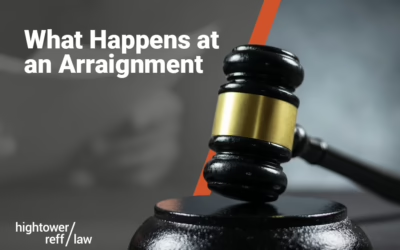 A felony warrant turns your world upside down. Not only are your freedom and your future on the line, if it’s your first arrest, you’ll have no idea what to expect. This series will give you the basic information you’ll want to know if you or a loved one is facing a criminal charge in Nebraska.
A felony warrant turns your world upside down. Not only are your freedom and your future on the line, if it’s your first arrest, you’ll have no idea what to expect. This series will give you the basic information you’ll want to know if you or a loved one is facing a criminal charge in Nebraska.
In part one of this criminal law series on felonies, we laid out your options once you learn of the warrant and what happens once you’re arrested. Part two covered the nitty gritty of plea bargains. In the third installment, we discussed the trial.
Now, in Part four, we cover the sentencing process.
The Sentence: No Rabbit Out of a Hat
On TV legal dramas it seems like the judge just pulls a sentence out of a hat. In the real world, that’s not how it works.
The court does have some discretion when sentencing for felonies, but the parameters are governed by Nebraska Sentencing Guidelines. The guidelines govern things like the minimum and maximum sentences for certain felonies and where the sentence is to be served.
Sentencing Guidelines Don’t Stop a Bitch
Don’t make the mistake of thinking that the Nebraska Sentencing Guidelines are going to save you from a bitch (slang for habitual criminal sentence). The Guidelines make it clear that they do not impact the habitual criminal sentencing laws.
PSI: Nebraska
Along with the Nebraska Sentencing Guidelines, the judge relies on a pre-sentence investigation (PSI) report when deciding a felon’s sentence. The PSI contains:
- an analysis of the circumstances surrounding the crime
- the offender’s history of delinquency or criminality
- the offender’s physical and mental condition, family situation and background, economic status, education, occupation, personal habits and any other matters that the probation officer deems relevant or the court directs to be included
The PSI can also include any written statements a victim submits to the county attorney or probation officer.
The court can order you to undergo psychiatric observation and evaluation as part of the PSI procedure. Your attorney can add to the PSI with character letters from your friends, family or co-workers as well as other positive things like good employment records and information about your community involvement.
The Hearing
The court will sentence you at a sentencing hearing. You’ll have the opportunity to address the court — and victims may as well. Depending on the circumstances, it may or may not be helpful for you to address the court, so you’ll need to make that decision with your attorney, just one of the many reasons having a good attorney to guide you throughout the PSI process is important.
Get Help Early
The best thing you can do if you are accused of a felony (or any crime) is to get experienced legal help from the beginning. My power to help you as a lawyer can be lessened if my client has done something to damage his or her case before I get involved.
If you need help with a felony or other criminal matter, contact Hightower Reff online, or call us at 402-932-9550.
Next Time…
Watch for Part V of our felony arrest series: To Appeal or Not to Appeal, That is the Question.
This article should not be construed as legal advice. Situations are different and it’s impossible to provide legal advice for every situation without knowing the individual facts.




